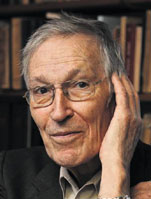

Walter Burkert
1931–March 11, 2015
|
 |

Arnold Hermann’s book ‘To Think Like God’ brings fresh life into the specialists’ debates stuck in the minutiae of Presocratic scholarship.
He advocates a thesis which resolutely asks for sense in the much-debated complex of Pythagoreans and Parmenides. As against current cosmological interpretations of Parmenides’ “being”, he concentrates on the quest for knowledge: Parmenides was seeking certainty in thought and discourse, he postulated the absolutely reliable account by the force of thinking, with certain ‘landmarks’ and provisos, with instruments such as ‘sufficient reason’, ‘contradiction’ and ‘infinite regress’. He thus achieved a breakthrough towards science as controlled thinking, as against approximative accounts of changing realities.
For introduction and contrast, Hermann presents Pythagoreanism in well-documented detail, including politics, ascetics, numerology, ‘mathematics of the soul’; his treatment is both sympathetic and critical, and comes out with the frank opposition of ‘pythagorizing’ and ‘philosophizing’. The final section of the book gets back to Pythagoreans and the problem of the ‘irrational’ in numbers, which makes reality and norms of thinking collide.
Hermann has closely studied the sources and secondary literature, he knows about the philological basis and long-lasting discussions; he has an interesting appendix on the ‘certainty sequence’ of evidence on Pythagoras and Pythagoreans; he presents a full translation of Parmenides’ poem with due notes. He is attentive to the historical and social background, including the interrelation of law-giving and law-courts with Parmenides’ argumentation. But he keeps to his course, never losing orientation, as to the discovery of logical argument, with Einstein and Popper side to side with Parmenides. This makes passionate though challenging reading. It may not be the last word in an age-old debate, but a blow of wind that dissipates much fog.
—Walter Burkert,
University of Zurich
|

